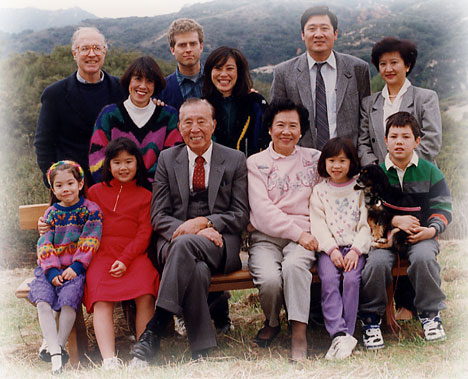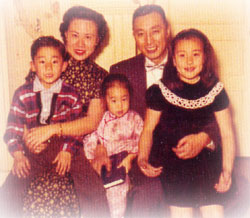|
ASIAN AMERICAN PERSONALITIES |
CONTACT US
|
ADVERTISING INFO
© 1996-2013 Asian Media Group Inc
No part of the contents of this site may be reproduced without prior written permission.
GOLDSEA | ASIAMS.NET | ASIAN AMERICAN PERSONALITIES
Manifest Destiny
PAGE 7 OF 8
JY: No, not really. I mean any number of people really. I try to balance. If I'm working with a younger director or less experienced director, I can be much more influential and forceful. If I'm working with a huge director, I know how to step back. I think part of it is having a level of flexibility and adaptability. You really have to view each production differently. What is needed here? Where am I going to be needed? There's really no hard and fast rule going in. And on every picture we learn something different. So it's part of constantly being quick on your feet. You just have to be very intuitive.

Janet Yang with her father, mother, brother, sister and their families.
GS: We've heard that only about one of ten projects that start development go into production.
JY: That sounds about right.
GS: How can you have any security in a business like that?
JY: You can't. If you want security, you shouldn't be in the business.
GS: Yet you've managed to keep the company going without too much problem?
JY: I wouldn't say without too much problem. Last year was a bad year for everybody, and last year was the first year I didn't make a movie. I didn't have anything in production. People said, 'Oh my god, the first year you've never had anything in production!' Yeah, it is the first year in my 14 years in the business. This year could be the second. Though I have other projects that are [being developed], I won't have anything in production. But I have some things coming.

Janet Yang (center) as a little girl, with her father, mother, brother and sister. |
GS: The money would always lag behind the world, we would think.
JY: Yeah, I've worked on some projects for 10 years and I may never see anything. But if you want to do it just for a paycheck, this is not the thing.
GS: Is there one type of movie that you really would love to make?
JY: I have several projects in hand that I would love to make -- that I think are great movies. Some are more epic. Some are more quietly dramatic. I couldn't name just one single thing...
GS: What is the quality you look for in a story that really excites you?
JY: I need to be emotionally engaged. I need there to be a level of authenticity. I'm not good with projects that are all over the place, so purely invented, or so purely the result of one person's imagination. Things that resonate for me have emotional truth. It's a level of authenticity.
GS: I have seen you described as a producer/screenwriter. Which of your films have you written for?
JY: I have never been credited as a screenwriter. Yet more misinformation.
CONTINUED BELOW
GS: Please paint a picture of one of your workdays.
JY: My typical workday involves a lot of phone calls, with writers, directors, agents, or if I am in or close to production, with financiers, bond companies, crews, actors, etc. More and more is being done by e-mail, which is kind of great since I am working with people all over the globe.
I also have a good number of meetings since there is no substitute for face time, typically with writers. Again, if I am in or close to production, it's a whole different story. Location scouts, meetings with production designers, d.p's, costume designers, intense script meetings with director and/or writer. In post, it's looking at a bunch of cuts, listening to mixes, marketing meetings, etc.
There's also a smattering of screenings, agency meetings, lunches, etc. mixed in with the occasional hair cut, teacher-parent conference, girlfriend gab fest, etc. which are always in too short supply.
GS: What are your parents' backgrounds?
JY: My father is from Shanghai. My mother is from Hunan Province. They came over as students and they didn't plan to live here. They came over to study and then go back. That was just between World War II and 1949 and obviously it wasn't going to be good for them to go back. They just waited and waited for the right time to go back. When I was born, they decided they weren't going to go back.
GS: What were they doing at the time you were born?
JY: My mother had a job at the United Nations. My father had a very tough time getting work initially and he trained as an engineer. His is a real Horatio Alger-type story. He convinced a company to hire him for free, for nothing. Because of the Red scare and all that, nobody would hire him. They hired him for free then started paying a little something because they started feeling guilty. He said, “Look everyone said that I don't have experience. How do I get a job without experience? Just let me work here so I can get experience.” The company that he started with ended up becoming the company he became vice-president of decades later after they merged with another company. He ended up becoming a senior vice-president.
GS: That's a great story.
JY: It is. It's very touching and it brings tears to my eyes just thinking about it. I saw these letters. He showed them to me, letters he wrote pleading for work. It was a tough time. They told us another story of when we drove down to Florida to go on a vacation. They had a hotel booked and they wouldn't let us stay there. It was a very different time. People need to be reminded that it wasn't that long ago.
GS: Do you have any siblings?
JY: I have an older brother and sister.
PAGE 8
| “Things that resonate for me have emotional truth and often emotional truth comes from something. It's a level of authenticity.” |
